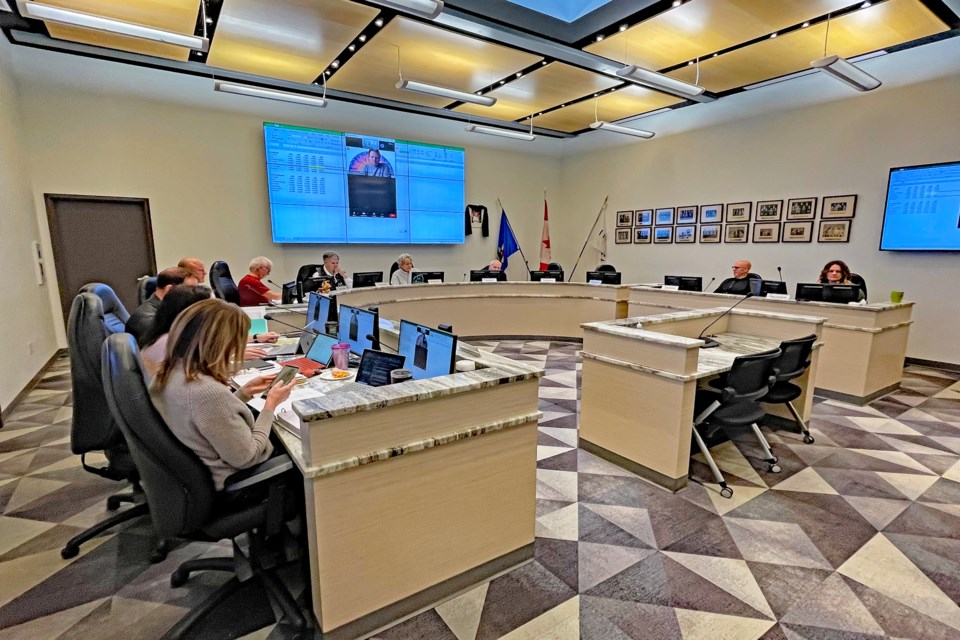INNISFAIL – The Town of Innisfail’s operating and capital budgets for 2023 have been unanimously passed by town council.
Innisfailians are moving into the new year knowing a four per cent municipal tax hike, the highest in at least eight years, has been approved.
And there is still a chance the approved increase last week could go even higher, or lower, depending on final assessment figures the town will receive at the end of February.
“If something happens and assessment comes in at a lower rate, we will likely have to increase it (tax rate) because we need that certain dollar value in our budget. We need to hit that number,” said Erica Vickers, director of corporate services, adding if assessment values come in higher the tax rate can be reduced. “Absolutely, yes.”
At its regular meeting on Dec. 12, council members, who held three days of challenging budget deliberations last month, approved the balanced 2023 operating budget of $25.8 million and the capital budget of $4.4 million; a reduction of about $2.8 million when compared to last year’s capital projects budget.
No funds were allocated to contingency.
Before school taxes are added, the four per cent increase translates to an extra $8 each month, or about $90 a year, on municipal tax bills for a home that is assessed at $322,210. This does not include the approved monthly $2 increase on 2023 wastewater bills and a $1.50 monthly hike for water.
“I think it's (tax rate) is a larger number than what our community has been used to over the last several years of course,” said Mayor Jean Barclay. “Hopefully people will understand what the inflationary pressures are. We need to keep moving forward as a community, and we wanted to keep service levels the same as they have been.”
In the meantime, two contentious issues remain from the 2023 budget process; the provincial government’s dramatic slashing of provincial Municipal Sustainability Initiative (MSI) funding and communication issues between the town and public.
“I do believe we should have waited until it's passed before we comment on the budget,” said Coun. Jason Heistad, noting local mainstream media budget stories were published at the end of the deliberation process before the municipal budgets were formally approved on Dec. 12. “There's an opportunity for us to still have further debate on it. There’s an opportunity to present the passed budget, explain why we passed everything operationally, as well as some of the goals that we have within our community the next year.”
Heistad was also not happy that the live stream video feed on the town’s website malfunctioned on Dec. 12; an issue that has been problematic for the town for at least the past two months. The town made Zoom available to the public for the Dec. 12 budget meeting only but it was not widely publicized.
“This needs to be corrected because when we’re passing the budget, we need to make sure there is accessibility for the public,” said Heistad, who would like the town to move back to Zoom live streaming instead of the current town website feed. “We need consistency.”
Barclay said town staff is working “very hard” to fix the live stream issues.
“I want to see it fixed and I know our staff is working very hard on getting it fixed,” Barclay said.
On the provincial MSI front, the town will be forced to trudge into 2023 with the worrisome reality that funding for infrastructure projects has been dramatically slashed to $847,106 from $1.8 million it once received in 2018.
MSI is being phased out by the provincial government for a new Local Government Fiscal Framework program and Barclay is worried there will be less than what was offered through the MSI program.
“It seems to be right now where it sits it's looking like it could be around thirty to thirty-five per cent less than the average MSI over the last decade. So, that's very concerning,” said Barclay.
Councillors Janice Wing and Heistad were blunter, with the latter maintaining tax increases for all municipalities are higher because of provincial cuts to MSI funding.
“Small towns and large cities are being hurt by this, and everything's being downloaded on to the municipal politicians, where we feel the heat from the electorate,” said Heistad.
Wing was reluctant to support the four per cent tax hike part because she felt a “stronger message” should have been sent to the province.
“I think it would have been a stronger message to the community and subsequently to the province if we said, ‘some of this really important work would have been funded through the provincial government, and we can't do it now because of those (MSI) cuts,” she said.
“That’s a significant reduction. It’s really bad for smaller communities.”



